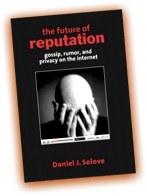Monday, October 15, 2007
The Future of Reputation: Gossip, Rumor, and Privacy On the Internet

Daniel J. Solove wrote a new book titled The Future of Reputation: Gossip, Rumor, and Privacy On the Internet. It’s “a book about how the free flow of information on the Internet can make us less free,” as Daniel puts it. He allowed us to get an extended glimpse of the book’s first chapter, which I excerpted below.
The Dog Poop Girl
It all began in realspace, on a subway train in South Korea. A young woman’s small dog pooped in the train. Other passengers asked her to clean it up, but she told them to mind their own business. That’s when it moved over to cyberspace and became even uglier.
Someone took photos of her and posted them on a popular Korean blog. (...) Another blogger, Don Park, explains what happened next:
Within hours, she was labeled gae-ttong-nyue (dog shit girl) and her pictures and parodies were everywhere. Within days, her identity and her past were revealed. Requests for information about her parents and relatives started popping up and people started to recognize her by the dog and the bag she was carrying as well as her watch, clearly visible in the original picture. All mentions of privacy invasion were shouted down. ... The common excuse for their behavior was that the girl doesn’t deserve privacy.

Across the Internet, people made posters with the girl’s photograph, fusing her picture with a variety of other images. The dog poop girl story quickly migrated to the mainstream media, becoming national news in South Korea. As a result of her public shaming and embarrassment, the dog poop girl dropped out of her university.
The story of the dog poop girl wasn’t known in the United States until Don Park wrote about it in his blog, Don Park’s Daily Habit. It became even more popular when the blog BoingBoing discussed the story. BoingBoing receives nearly ten million visits per month – more than the circulations of many newspapers and magazines. In no time, newspapers and websites around the world were discussing the story.
The story of the dog poop girl raises a number of intriguing issues about the Internet, privacy, norms, and life in the Information Age. Not picking up your dog’s poop is bad behavior in most people’s books, but was the reaction to her transgression appropriate? We all have probably engaged in rude behavior or minor wrongdoing. But is it going too far to transform the dog poop girl into a villain notorious across the globe? (...)
The Norm Police
In the dog poop girl case, people harnessed the power of the Internet to enforce a norm – the obligation to clean up after one’s dog. Norms are “social attitudes of approval and disapproval,” the law professor Cass Sunstein writes. Norms specify “what ought to be done and what ought not to be done.” Norms bind societies together; they regulate everyday conduct; they foster civility. They are the oil that reduces the friction of human interaction. We need to maintain norms of courtesy so that we can all get along nicely. Imagine if we didn’t have norms like first-come, first-served. Fisticuffs would quickly follow. In short, norms are a central mechanism through which a society exercises social control.
To be effective, norms must be regularly followed. If people flout norms and get away with it too often, norms can weaken and lose their influence over behavior. When somebody butts in line, many people usually just grumble under their teeth, but there are a few folks who confront that norm violator. These “norm police” help enforce norms, and they are essential to ensuring that norms remain strong.
The dog poop girl violated a norm that most people would agree with, but were the norm police too harsh in punishing her? Most norm enforcement involves angry scowls or just telling a person off. The blogosphere can be a much more powerful norm-enforcing tool, allowing bloggers to act as a cyberposse, tracking down norm violators and branding them with digital marks of shame. Having a permanent record of norm violations is upping the sanction to a whole new level. (...)
Generation Google
Details about your private life on the Internet can become permanent digital baggage. For example, a story in the Boston Globe Magazine discusses the plight of a thirty-four-year-old professional named Michael. Michael was briefly in prison when he was a juvenile. While in prison, he wrote a few articles about it in specialized journals. These articles now come back to haunt him. They are pulled up anytime somebody does a Google search for his name. Michael is single, and his Google baggage travels with him on most dates. On the first or second date, most women start interrogating Michael about his stint in prison. As Michael explains: “When you meet someone ... you don’t say, ’I had an affair one time,’ or ’I was arrested for DUI once,’ or ’I cheated on my taxes in 1984.’” Even when people don’t ask him about his past, Michael’s digital skeletons continue to affect him. Whenever there’s an awkward silence in a conversation, Michael thinks the worst: “Instead of thinking, ’Was I curt last week?’ or ’Did I insult this political party or that belief?’ I have to think about what happened when I was 17.” In one instance, Michael was interviewed several times for a job when, suddenly, the potential employer stopped calling him. “[Michael’s] hunch: Someone Googled him. But the worst part is, he’ll never know.” Michael’s problem is not that he is embarrassed by his past or wants to escape from it. Rather, he resents having to constantly justify himself and explain his past. Worse still, he is rarely afforded the opportunity to explain.
From the dawn of time, people have gossiped, circulated rumors, and shamed others. These social practices are now moving over to the Internet, where they are taking on new dimensions. They transform from forgettable whispers within small local groups to a widespread and permanent chronicle of people’s lives. An entire generation is growing up in a very different world, one where people will accumulate detailed records beginning with childhood that will stay with them for life wherever they go. In Nathaniel Hawthorne’s The Scarlet Letter, Hester Prynne was forced by her colonial New England village to wear a scarlet letter A to represent her sin of adultery. The Internet is bringing back the scarlet letter in digital form – an indelible record of people’s past misdeeds. One commentator to Don Park’s post about the dog poop girl said it best: “Right or wrong, the internet is a cruel historian.” The Internet is indeed a cruel historian. Who wants to go through life forever known as the dog poop girl?The Future of Reputation: ... by Daniel J. Solove | Comments (15)
>> More posts
Advertisement
This site unofficially covers Google™ and more with some rights reserved. Join our forum!
